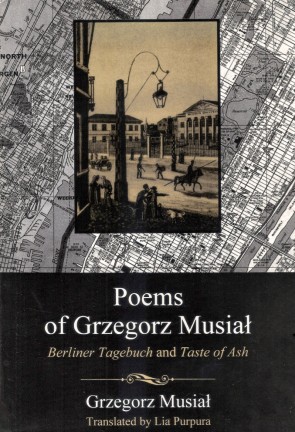Poems of Grzegorz Musial: Taste of Ash & Berliner Tagebuch

Grzegorz Musial’s Berliner Tagebuch (1989) and Taste of Ash (1992) appeared on either side of the political fault line that was the collapse of communism in Poland. Collected here in one volume, these works present the power and urgency of one of Poland’s most important young poets. Berliner Tagebuch (Berlin Diary) addresses questions of memory, guilt, and responsibility for the Holocaust, as well as the poet’s desire to resist the cruelty of time. In Taste of Ash, Musial encounters the state not merely of his own country, but of Western civilization, too, with love poems and spiritual dialogues of intimacy and wonder. Taste of Ash, in particular, reveals the profound influence of the contemporary American lyric on Musial’s aesthetic — a stunning cross-fertilization nourished by poets as diverse as William Carlos Williams and Allen Ginsberg.
“To my mind, Grzegorz Musial is among the very few genuine heirs of the great generation of postwar Polish poets. He has learnt from them the ultimate value of specific detail, luminously observed and its ethical dimension. Musial’s eye is acute (for he is, by profession, an ophthalmologist), but beyond this, it is his novelistic sense of what is salient, his syntactical control, that makes these poems so memorable. . . .Musial is heir to the first postwar generation in another way as well: he evokes the period just before the cataclysm that devastated Poland and brought about the destruction of European Jewry — obsessively and vividly. He does not seek to explain, but neither does he shrink from asking, from thinking, from reviewing the images that will not leave him, even as he journeys forth to contemporary America. That one can see all of this so clearly is, of course, a tribute to Musial’s translator (or should one rather call her his co-rewriter in English?), the poet Lia Purpura. I have watched these translations evolving over a number of years. They are intensely felt, and thought-out. One reads them with complete confidence that what one is getting is the author in English. Of how many translations could one say the same? ” — Daniel Weissbort, Editor, Modern Poetry in Translation
” ‘Don’t come yet, it’s a terrible age.’ Grzegorz Musial says. He is a kind of Cavafy looking over the ruins of a Europe that is part outlandish twenties, part horrific forties, and beyond. Only it is much more deadly than Alexandria ever was, and the poetry — sad, bitter, resigned, amazed — reflects that. These are carefully rendered, moving poems.” — Gerald Stern
“Both distinct collections, Berliner Tagebuch and Taste of Ash, reward the reader with their quick, trenchant poems — poems with such sudden flashes and reaches of reference. Many of them impressed me like wood carvings, like pieces of some graphic, wrenching series of artwork deliberately held to the light for wonderment.” — William Stafford
